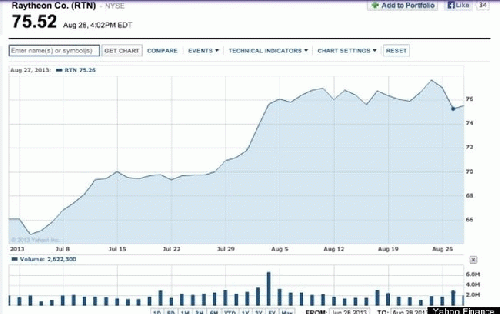(Article changed on September 3, 2013 at 05:21)
(Article changed on September 2, 2013 at 11:45)
(Article changed on September 2, 2013 at 11:42)
This article was originally published on the Madison Independent Examiner. A slide show and video is available for viewing there.
by Public domain via Yahoo! finance
Who benefits from a strike on Syria? Apparently Raytheon, the manufacturer of cruise missiles aboard U.S. destroyers off the coast of Syria, is one beneficiary.
On Friday, the White House released an intelligence report assessing "with high confidence" that chemical weapons were used in Syria on civilians by the Syrian government. There are serious doubts both within U.S. intelligence agencies and the international community as to whether this allegation is accurate. Yet President Obama is seeking congressional approval for a military strike on Syria.
It is fairly evident that some sort of nerve gas was released on August 21 in Ghouta, near Damascus. The real question is: Who released it? The U.S. claims it was fired by the Syrian government with rockets and artillery. Independent and foreign media outlets and the governments of other nations claim otherwise.
Based on numerous interviews with doctors, Ghouta residents, rebel fighters and their families, many people at the scene believe that certain rebels received chemical weapons via the Saudi intelligence chief, Prince Bandar bin Sultan, and were responsible for carrying out the deadly gas attack.
According to survivors of the attack, some of which are rebels, 13 rebels were asked to carry weapons by a Saudi militant known as Abu Ayesha, who was leading a fighting battalion. The weapons were described as having a "tube-like structure" while others were like a "huge gas bottle." The weapons were stored in tunnels.
The rebels were not told what the weapons were or how to use them. A rebel interviewed by Dale Gavlak and Yahya Abaneh said, "When Saudi Prince Bandar gives such weapons to people, he must give them to those who know how to handle and use them." Another rebel said, "We were very curious about these arms. And unfortunately, some of the fighters handled the weapons improperly and set off the explosions."
The above information has been reported in dozens of foreign media outlets, including the Voice of Russia, yet the U.S. mainstream media remains silent on the matter.
U.S. intelligence officials are not so certain that the suspected chemical attack was carried out on Assad's orders, or even completely sure it was carried out by government forces. In intelligence jargon, "high confidence" does not mean certainty. The uncertainty calls into question the statements by Secretary of State John Kerry, Vice President Joe Biden and President Obama.
In a briefing on Wednesday, State Department spokeswoman Marie Harf admitted that intelligence agencies do not know who gave the order to use chemical weapons, even if they were deployed by the Syrian government. Harf said. "I don't know what the facts are here. I'm just, broadly speaking, saying that he is responsible for the actions of his regime."
Multiple U.S. officials used the phrase "not a slam dunk" to describe the intelligence picture - a reference to then-CIA Director George Tenet's insistence in 2002 that U.S. intelligence showing Iraq had weapons of mass destruction was a "slam dunk" - intelligence that turned out to be wrong.
The British Parliament voted against participating in any strikes on Syria because while advocating military action, Prime Minister David Cameron had to admit that there was "no 100 percent certainty" about who was responsible for a chemical weapons attack in Syria. France, Germany, Canada, Italy and the Arab League have also declined to lend military assistance to a U.S. strike on Syria, citing uncertainties for similar reasons.
(Note: You can view every article as one long page if you sign up as an Advocate Member, or higher).





